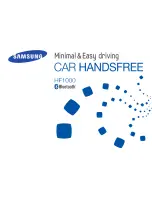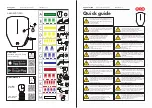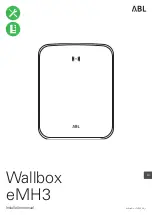
If you will be pulling a trailer that, when loaded, will
weigh more than 5,000 lbs (2 270 kg) be sure to use a
properly mounted weight-distributing hitch and sway
control of the proper size. This equipment is very
important for proper vehicle loading and good handling
when driving. Always use a sway control if the trailer
will weigh more than these limits. You can ask a
hitch dealer about sway controls.
Safety Chains
You should always attach chains between your vehicle
and your trailer. Cross the safety chains under the
tongue of the trailer to help prevent the tongue from
contacting the road if it becomes separated from
the hitch. Instructions about safety chains may be
provided by the hitch manufacturer or by the trailer
manufacturer. Follow the manufacturer’s
recommendation for attaching safety chains and do not
attach them to the bumper. Always leave just enough
slack so you can turn with your rig. Never allow
safety chains to drag on the ground.
Trailer Brakes
If your trailer weighs more than 1,500 lbs. (680 kg)
loaded, then it needs its own brakes — and they must
be adequate. Be sure to read and follow the instructions
for the trailer brakes so you’ll be able to install, adjust
and maintain them properly.
Your trailer’s brake system can tap into the vehicle’s
hydraulic brake system only if:
•
The trailer parts can withstand 3,000 psi
(20 650 kPa) of pressure.
•
The trailer’s brake system will use less than
0.02 cubic inch (0.3 cc) of fluid from your vehicle’s
master cylinder. Otherwise, both braking systems
won’t work well. You could even lose your brakes.
If everything checks out this far, then make the brake
fluid tap at the port on the master cylinder that
sends fluid to the rear brakes. But don’t use copper
tubing for this. If you do, it will bend and finally break off.
Use steel brake tubing.
4-55
Summary of Contents for Bravada 2004
Page 5: ...These are some examples of symbols you may find on your vehicle v...
Page 6: ...NOTES vi...
Page 16: ...Put someone on it Get it up to speed Then stop the vehicle The rider doesn t stop 1 10...
Page 106: ...NOTES 2 44...
Page 109: ...NOTES 3 3...
Page 110: ...Instrument Panel Overview 3 4...
Page 276: ...Engine Compartment Overview When you open the hood you ll see the following 5 12...
Page 364: ...5 100...
Page 370: ...NOTES 5 106...
Page 402: ...NOTES 7 14...
















































